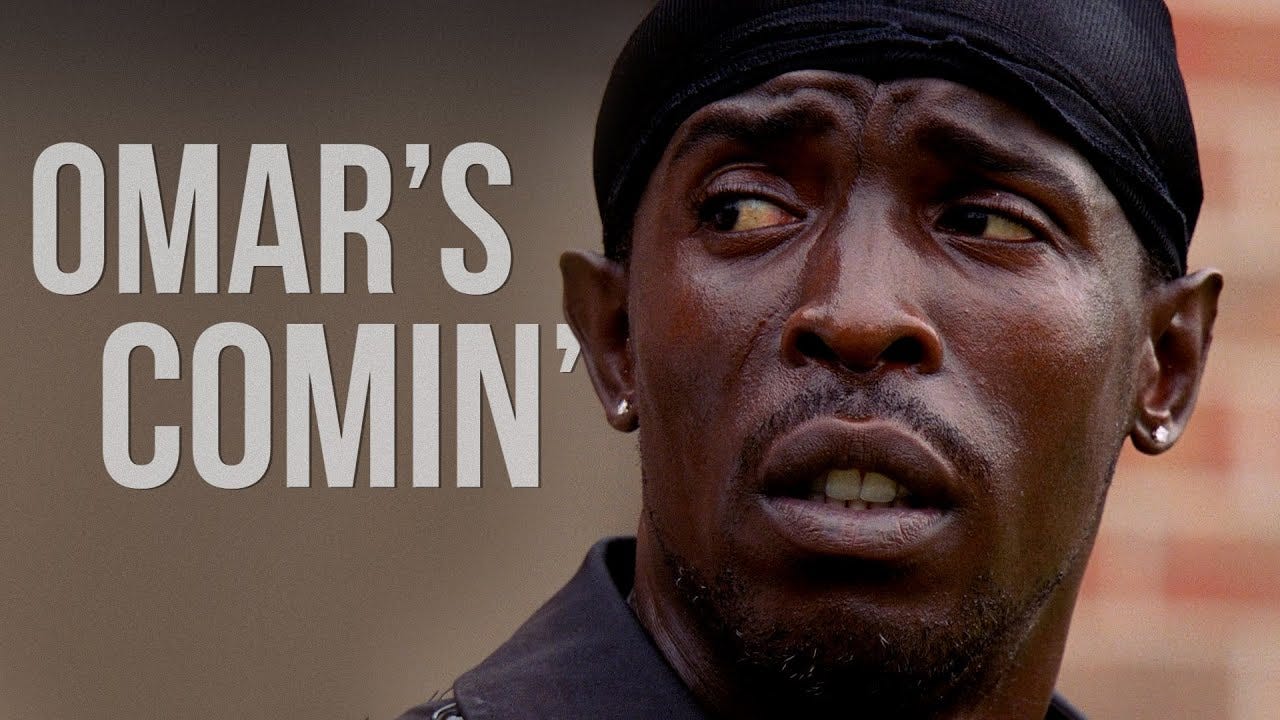Omar from "The Wire": Why Do We Love Him?
He got the shotgun, you got the briefcase
Being from Baltimore, I find the “The Wire” to be one of the most important shows ever. It harkens back to what some refer to as the “golden era” of HBO of the early 2000s, along with “Sex and the City,” “Six Feet Under,” and “The Sopranos.” The show focuses on the players of the drug game—kingpins, dealers, lawyers, police, politicians, educators, longshoremen, and/or journalists, depending on the season—and uses the streets of Baltimore practically as a character in itself. Each season focuses on a specific theme with reoccurring characters. It mostly takes place in West Baltimore, although the second season about the longshoremen takes place in South Baltimore’s Locust Point neighborhood.
Now I will admit, I was a bit too young to understand the show fully when it first aired. Because I came of age in a nice suburban environment, many of the subtleties of the show went over my head then. I rewatched after amassing more life experience. I can say that the show is still relevant, although now a bit dated with things like the constant use of pay phones. It was an innovative show then, now it just feels old-school in a good way.
One of the show’s most beloved characters was Omar Little, played by Michael K. Williams (may he rest). Omar is known for robbing drug dealers and for his strict personal code of ethics: “I ain’t never put my gun on nobody who wasn’t in the game.” Barack Obama once called Omar one of his favorite TV characters of all time.
Here is one of the most iconic Omar scenes from the show:
Omar is certainly an interesting character, but what he ultimately represents is wasted potential. He shows a great amount of intelligence that he puts towards a life of crime. His sense of justice revolves around robbing and shooting drug dealers, and he doesn’t always even get that right. In one instance, he shoots Brother Mouzone, a far shrewder and put-together version of himself, after being duped into believing that Mouzone had murdered his boyfriend. Omar then calls for emergency services, leaving the viewer to conclude that he’s still adhering to his code for taking steps to remedy his error. But for someone who devoted his life to this craft, he was easily deceived.
In short, there is really nothing to like about him.
Seriously — what exactly is there to admire about Omar? That carries around a shotgun in his pajama pants? That he eats Cheerios in a vacant house with his boyfriend? That he doesn’t get to live out his truth in public, since his community isn’t exactly gay-friendly? That no one in his neighborhood actually likes him? That after everything he went through, he’s ultimately killed by a 9 year-old?
“But he has a cool scar across his face, that makes him badass!” That’s superficial.
“He’s so cool because he carries a gun everywhere and he can do whatever he wants!” Nope. Every episode of the series just shows repeated examples of how limited Omar’s choices actually were.
We’re not drawn to Omar because he’s charming, and no one is particularly rooting for him (at least not the way we root for Bubbles to overcome his demons). We are drawn to him for his awesome sense of power and identity. Omar knows exactly who he is. He has a very clear understanding of what he can and cannot do, and most importantly, everyone around him understands it too. All he has to do when he steps outside is whistle “The Farmer in the Dell,” and everyone automatically knows “Omar’s comin’!” Can you command that level of respect in your community? I doubt it.
Man has to have a code. Do you know yours?
Whether or not you’ve seen it before, “The Wire” is worth a (re-)watch. It’s all in the game!



We loved The Wire and especially Omar for the reason you cite and his treatment of lawyer Levy (judge’s reaction 🤷🏻♂️)